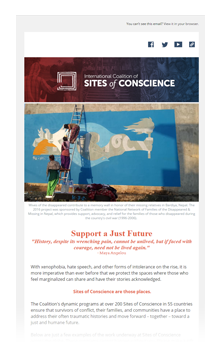Sites of Conscience:
- interpret history through site;
- engage the public in programs that stimulate dialogue on pressing social issues;
- share opportunities for public involvement and positive action on the issues raised at the site; and
- promote justice and universal cultures of human rights.
A Site of Conscience is any memorial, museum, historic site, memory initiative or non-governmental organization that commits to these defining operating principles.
Sites of Conscience range from grassroots efforts catering to small communities of survivors to major state-funded projects that seek to have broad national reach. Given the vast array of sites, programs, resources, audiences and socio-political contexts within which Sites of Conscience work, the impact of individual Sites of Conscience varies based on each site’s mission and audience. A 2010 evaluation focusing on three Sites of Conscience in South Africa, the United States and Bangladesh found that these sites had multiple impacts on their visitors, including changing opinions, raising awareness, improving relationships, encouraging civic engagement and increasing emotional understanding of the human consequences of atrocity. In addition to broad scale impact, Sites of Conscience have been extremely successful at the local level, giving voice to some of the most marginalized groups in society and raising individual awareness on a range of social and human rights issues. In Sierra Leone, for example, youth participating in a recent dialogue program at the Special Court for Sierra Leone were able to make the connection between the violent civil war era in which they grew up and the growing culture of violence in their schools. By recognizing this connection, the youth were able to develop strategies to address violence in their communities. The Coalition is committed to ongoing evaluation of our programs. We are currently conducting a long-term evaluation project to better understand the global impact of Sites of Conscience in addressing wider social processes such as human rights reform, violence prevention and transitional justice.
Memorialization is the process of creating public memorials. Public memorials are physical or virtual representations or commemorative activities that concern events in the past and are located in public spaces or are publicly accessible (such as online projects).
A memory initiative is any community or group effort that publicly remembers an event or series of events in history. Memory initiatives can range from commemorative activities, to archiving and documentation efforts, to a wide range of collective creative processes – such as oral histories, body mapping – and more. Many memory initiatives are “unofficial” in that they may not be supported or commissioned by State entities.
The urge to remember is universal. Communities all over the world seek to publicly remember events of the past – whether through commemorating anniversaries like Holocaust Remembrance Day, building memorials like the Vietnam Veterans’ Memorial, or preserving places where significant events took place like Tiananmen Square. Such efforts are often designed to evoke a specific reaction or set of reactions, including public acknowledgment of the event or people represented, personal reflection or mourning and civic education. Serving diverse social and political goals, memorialization has the potential to contribute to positive social transformation, but also to divide societies. While one memorial might serve as a beacon of “never again,” another might be used as a tool to promote revised historical narratives, to marginalize personal stories and experiences or to celebrate “victors’ justice.” The effectiveness of memorialization as a tool for positive change therefore depends on the goals of the memorial and the process through which it is created. The International Coalition of Sites of Conscience provides guidance to organizations and government institutions to develop memorials that facilitate broad civic engagement in the promotion of human rights, social justice and lasting peace.
Transitional justice is a term used to describe the judicial and non-judicial measures put into place by countries in order to address legacies of conflict and human rights abuses. These measures often include formal criminal prosecutions, truth commissions, reparations programs and various kinds of institutional reforms, but should also include more holistic initiatives that specifically address the needs of everyday people affected by conflict and human rights abuses. Visit the Coalition’s Global Initiative for Justice, Truth and Reconciliation to learn more about our work in this area.
Transitional justice processes are typically set in place following wide-scale human rights violations and conflicts. The memorialization process is fundamental to recovering from trauma and atrocity and thus plays an important role for societies that are undertaking or involved in transitional justice processes. Memorialization is important in various aspects of the transitional justice process, such as establishing the truth about historical events, providing symbolic reparation to victims, and assisting in the long-term building of democracy.
Truth commissions from Chile to Liberia have recommended memorialization as a way to recognize truths about what happened, to honor victims and to provide spaces and ways for people to build a shared understanding of the past and a vision for moving forward. Moreover, memorialization initiatives such as Memoria Abierta’s (Argentina) archiving and documentation efforts and the Liberation War Museum’s (Bangladesh) collection of oral histories, testimonies and archives have also served to catalyze public demands for establishing the truth and to provide evidence in truth commissions and other judicial processes.
Millions of people visit memorials every day and many use such spaces to express or identify personal connections to political issues. These places and efforts can be safe outlets for people to come together and make civic choices that shape and sustain democracy. In societies that have experienced recent ruptures, such as conflict or atrocity, memory initiatives can unite people across vastly different experiences and perspectives to forge ways to work together in rebuilding the social fabric and commit to lasting peace.

